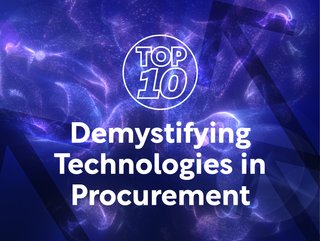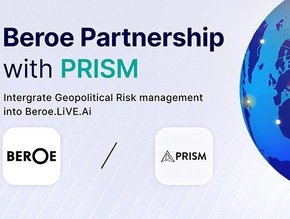Top 10 demystifying technologies in procurement

Despite global spend on digital adoption expected to reach US$2.4tn in 2024, 84% of digital transformation projects still continue to fail. According to the IDC this can be attributed to 47% of organisations lacking the digital skills to be successful in their efforts. In spite of this, 60% of business leaders believe digital transformation will be a critical growth driver, with those that do priorities digital transformation reporting to be 26% more profitable.
As such, “digital transformation is strongly anchored in procurement departments’ agendas,” says PwC, with 51% of CPOs ranking digital transformation among their top three priorities. In this Top 10, we take a look at some of the technologies that are demystifying the procurement industry.
10. Cybersecurity solutions
While the benefits of technology adoption in procurement is clear, digitalisation of operations doesn’t come without risks, in particular the introduction of cyberthreats and data breaches.
Currently it is estimated that 2023 will face 33 billion account breaches, with 800,000 cyber attacks recorded in total. On average, there is a hacker attack every 39 seconds. With this in mind it is vital for procurement functions to enhance their security measures and benefit from the protection such solutions provide, including data protection and management, reputation preservation, enhanced productivity, regulation compliance, improve cyber posture, trust and credibility, and streamlines access control.
9. Supplier management tools
Whether a large or small organisation, all rely on their suppliers to operate. As such supplier management tools can greatly help in the successful management and create stong professional relationships. Key benefits fo supplier management tools include improved communication, access to real-time data, enhanced supply chain visibility, increased efficiency and productivity, reduced costs, and improved supplier performance.
8. Augmented reality (AR)
Revolutionising procurement workflows by providing innovative solutions to streamline and enhance the entire process, augmented reality (AR) is transforming traditional practices to become more efficient and effective. Other benefits include real time visibility and the elimination of manual research, remote collaboration and communication, enhanced supplier management, instant access to critical data, and increased transparency.
7. Blockchain
Expected to be worth US$1.43tn by 2030, blockchain technology could boost the global GDP by US$1.76tn. Top sectors driving the adoption of blockchain are finance, healthcare, agriculture, and manufacturing, but how can these sectors’ procurement function benefit from this technology? Key benefits of blockchain in procurement include increased transparency, smart contracts, and reduced costs.
6. Cloud
Of organisation with more than 1,000 employees, 94% have adopted cloud technology in a large proportion of their workloads. As technology advances, more organisations are exploring the use of multi-cloud or hybrid cloud approaches rather than simply using traditional public or private cloud.
As such it is clear to see that cloud is a vital tool within the day to day function of an organisation. Ways in which procurement sepcifically can benefit include cost efficiency, end-to-end integration, easy collaboration, user friendly, and great visibility.
5. IoT
By 2030, it is estimated that IoT will unlock between US$5.5tn and US$12.6bn in value globally. Turning to the application of IoT in procurement help professional in the function to navigate its complexities. benefits of IoT for the function include enhanced visibility and collaboration, the ability to track materials, inventory management, compliance and auditing, and improved decision-making.
4. Sustainable procurement technology
Battling the challenges of integrating sustainability and ESG into procurement processes and decision-making, while continuing to meet stakeholder requirements, procurement functions are looking to organisations that are developing platforms and processes to ensure they are successful.
Such platforms and processes can help organisations to better sourcing materials, drive ciruclarity within their operations as well as trace their carbon emissions. Ultimately these technologies drive greater transparency within the function and the wider supply chain.
3. Big data analytics
Helping procurement professionals make strategic decisions, big data analytics is the analysis and use of information that is of extreme size and complexity.
“At one midsize manufacturing company with approximately US$2bn in annual revenue, for example, procurement had data on more than 20,000 transactions for a single category,” explains McKinsey.
With the procurement function generating vast amounts of data, big data analytics can benefit procurement functions when it comes to risk management, predictions, compliance, and collaboration.
2. Machine learning
Reshaping the traditional practices of procurement, machine learning - similarly to AI - offers unprecedented levels of efficiency and strategic advantage for those implementing the technology.
Offering exceptional analytics capabilities, machine learning helps to automate the mundane, time consuming, and repetitive tasks for procurement functions. As such professionals benefit from gaining back time to focus their expertise on more strategic tasks that have drive greater profitability.
Core areas in which machine learning can be best applied include spend analysis, sourcing, risk mitigation, and contract management.
1. Generative AI
According to PwC, AI is predicted to contribute US$15tn to the global economy by 2030. The transformative potential of the technology, specifically Generative AI and its ability to quickly analyse complex business activities and predict future market developments.
Key ways in which Generative AI will benefit the procurement industry include increased efficiency, productivity improvement, in-depth market analysis, risk mitigation, spend reduction, sustainability and compliance.
“Generative AI presents a once-in-a-decade opportunity to transform procurement,” says Bain & Company. “We see generative AI disrupting all aspects of a procurement organisation, from strategy to operations.”







